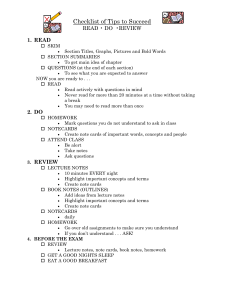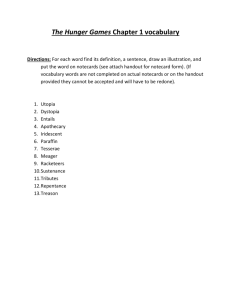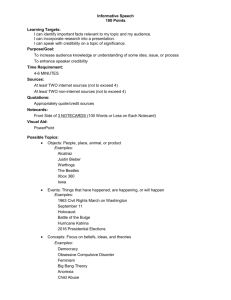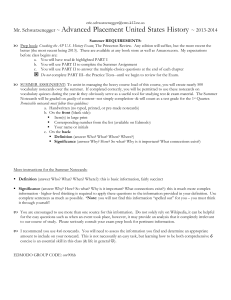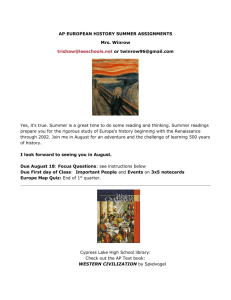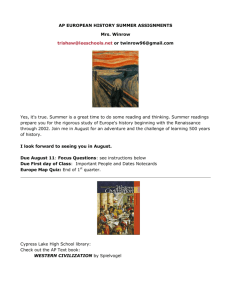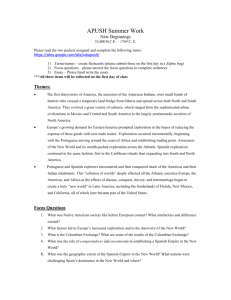English 207, Fall 2009 syllabus
advertisement
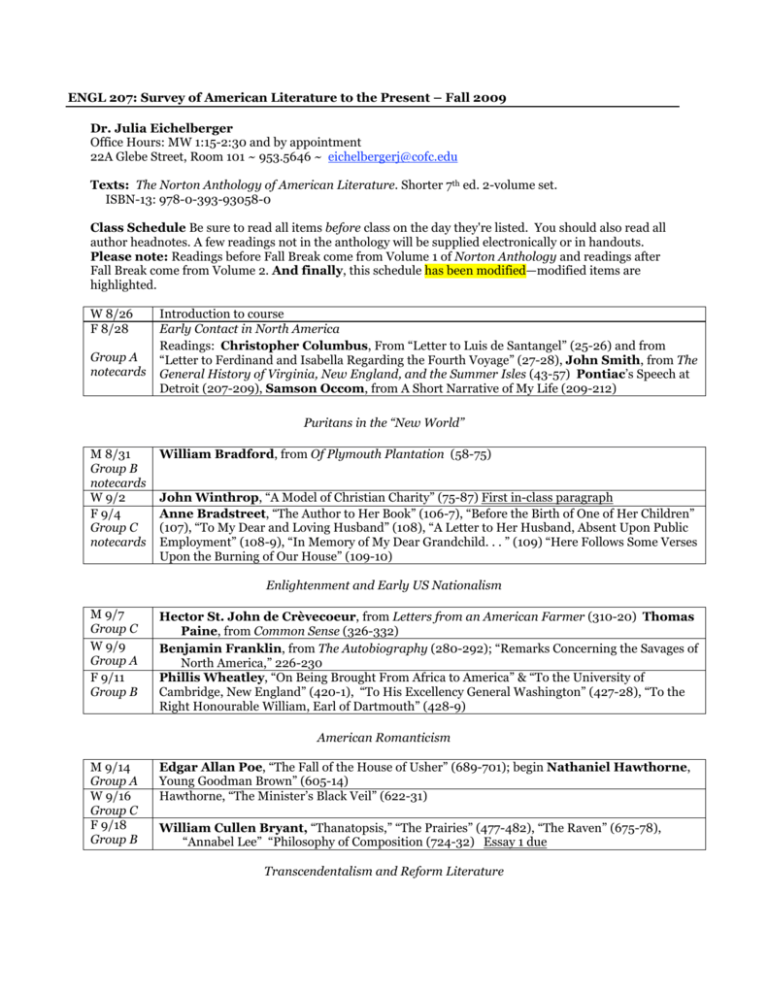
ENGL 207: Survey of American Literature to the Present – Fall 2009 Dr. Julia Eichelberger Office Hours: MW 1:15-2:30 and by appointment 22A Glebe Street, Room 101 ~ 953.5646 ~ eichelbergerj@cofc.edu Texts: The Norton Anthology of American Literature. Shorter 7th ed. 2-volume set. ISBN-13: 978-0-393-93058-0 Class Schedule Be sure to read all items before class on the day they're listed. You should also read all author headnotes. A few readings not in the anthology will be supplied electronically or in handouts. Please note: Readings before Fall Break come from Volume 1 of Norton Anthology and readings after Fall Break come from Volume 2. And finally, this schedule has been modified—modified items are highlighted. W 8/26 F 8/28 Group A notecards Introduction to course Early Contact in North America Readings: Christopher Columbus, From “Letter to Luis de Santangel” (25-26) and from “Letter to Ferdinand and Isabella Regarding the Fourth Voyage” (27-28), John Smith, from The General History of Virginia, New England, and the Summer Isles (43-57) Pontiac’s Speech at Detroit (207-209), Samson Occom, from A Short Narrative of My Life (209-212) Puritans in the “New World” M 8/31 Group B notecards W 9/2 F 9/4 Group C notecards William Bradford, from Of Plymouth Plantation (58-75) John Winthrop, “A Model of Christian Charity” (75-87) First in-class paragraph Anne Bradstreet, “The Author to Her Book” (106-7), “Before the Birth of One of Her Children” (107), “To My Dear and Loving Husband” (108), “A Letter to Her Husband, Absent Upon Public Employment” (108-9), “In Memory of My Dear Grandchild. . . ” (109) “Here Follows Some Verses Upon the Burning of Our House” (109-10) Enlightenment and Early US Nationalism M 9/7 Group C W 9/9 Group A F 9/11 Group B Hector St. John de Crèvecoeur, from Letters from an American Farmer (310-20) Thomas Paine, from Common Sense (326-332) Benjamin Franklin, from The Autobiography (280-292); “Remarks Concerning the Savages of North America,” 226-230 Phillis Wheatley, “On Being Brought From Africa to America” & “To the University of Cambridge, New England” (420-1), “To His Excellency General Washington” (427-28), “To the Right Honourable William, Earl of Dartmouth” (428-9) American Romanticism M 9/14 Group A W 9/16 Group C F 9/18 Group B Edgar Allan Poe, “The Fall of the House of Usher” (689-701); begin Nathaniel Hawthorne, Young Goodman Brown” (605-14) Hawthorne, “The Minister’s Black Veil” (622-31) William Cullen Bryant, “Thanatopsis,” “The Prairies” (477-482), “The Raven” (675-78), “Annabel Lee” “Philosophy of Composition (724-32) Essay 1 due Transcendentalism and Reform Literature M 9/21 Group C W 9/23 Group B F 9/25 Group A Ralph Waldo Emerson, from Nature (492-95) ; Henry David Thoreau, “Where I Lived, and What I Lived For,” from Walden Emerson, “The American Scholar”; Thoreau, Resistance to Civil Government” (829-44) Frederick Douglass, from Narrative of the Life of Frederick Douglass, Chapters 1-3 (931-39), Chapters 6-7 (944--50), and part of Chapter 10 (956-967) Writers Without Categories M 9/28 W 9/30 Group B F 10/2 Test I Herman Melville “Bartleby, the Scrivener” (1093-1118) M 10/5 A W 10/7 C Whitman, from Song of Myself, Stanzas 1-15 (1011-22) and Stanzas 48-52 (1053-55) Emily Dickinson “I taste a liquor Never Brewed” (1203), “Wild nights- Wild nights!” (1205), “The Soul selects her own Society” (1212), “The Robin’s my criterion for tune,” “I dwell In Possibility” (handout) Dickinson, “ ‘Faith’ is a fine invention” (1203), “Some keep the Sabbath going to Church” (12034), “After great pain, a formal feeling comes” (1211), “This was a Poet” (1213), “I heard a Fly buzz—when I died—“ (1215) Realism(s) F 10/9 Make-up notecards Melville poems from Battle-Pieces: “The Portent” and “A Utilitarian View of the Monitor’s Fight” (1174-1175); introduction to Walt Whitman Tim O’Brien Reads at the College of Charleston: 5 PM at Kresse Arena M 10/12 W 10/14 B F 10/16 C Fall Break. Switch to Volume 2 of your textbook. Mark Twain, Chapters 1-3 (101-110) and 31 (236-42) of The Adventures of Huckleberry Finn M 10/19 A W 10/21 B F 10/23 Make-up notecards Charles Chesnutt, “The Wife of His Youth” “The Passing of Grandison” (464-483) Henry James, Daisy Miller: A Study (319-356) Regionalism Kate Chopin, "At the 'Cadian Ball" (428-435)), "The Storm" (435-439) Naturalism Stephen Crane, “The Open Boat” (603-19) Modernism(s) M 10/26 A W 10/28 C F 10/30 B M 11/2 C W 11/4 F 11/6 A Robert Frost, “Mending Wall” (777-8), “After Apple-Picking” (782-3), “The Wood-Pile” (7834), “The Road Not Taken” (784), and “Out, Out—” (786) Wallace Stevens, “Anecdote of the Jar” (821) Wallace Stevens, “Thirteen Ways of Looking At a Blackbird” (821-23) William Carlos Williams, “The Young Housewife” (833-4), “Spring And All” (836), “The Red Wheelbarrow” (838), and “This Is Just to Say” (839) Essay 2 due at 5 PM Claude McKay, "If We Must Die" (970) and "Lynching" (970) Langston Hughes, "Negro Speaks of Rivers" (1089), "Mulatto" (1091-1092), "Song for a Dark Girl" (1092) Countee Cullen, "Heritage" (1108-1111) Sherwood Anderson, from Winesburg, Ohio, “Hands” (802-806) Test II Hemingway, “Soldier’s Home,” “A Clean, Well-Lighted Place” (on reserve) Modernist Writers and/in the South (The Southern Literary Renaissance) M 11/9 A W 11/11 B F 11/13 C William Faulkner, “A Rose for Emily” (1042-48) Eudora Welty, “Petrified Man” (1149-58) Richard Wright, “The Man Who Was Almost a Man” (1113-21) Essay 3 due Postwar/Postmodern American Literature M 11/16 C W 11/18 A F 11/20 B Allen Ginsberg, “Howl” (1416-24), “A Supermarket in California” (1425) Robert Lowell, “For the Union Dead” (1359-61) John Cheever, “The Swimmer” (1233-1241) Tim O’Brien, “How to Tell a True War Story” (on reserve) Donald Barthelme, “The School” (on reserve) M 11/23 Make-up notecards W 11/25 F 11/27 Sylvia Plath, “Morning Song,” “Lady Lazarus” (1477-1480), Elizabeth Bishop, “In the Waiting Room,” (1229-30), Gwendolyn Brooks, “kitchenette building,” “the Sundays of Satin-Legs Smith” (WebCT) Thanksgiving break Thanksgiving break W 12/2 B F 12/4 C Multicultural Identities: “What Is An American?” Billy Collins, “Forgetfulness,”(1578) “The Night House” (1580) “The Names” (handout) Li-Young Lee, “Persimmons” (1670-72) Essay 4 due Sandra Cisneros, “Woman Hollering Creek” (1644-51) Sherman Alexie, “At Navajo Monument Tribal School” (1676) ZZ Packer, “Drinking Coffee Elsewhere” (handout) M 12/7 12/9 12/14 Last day of classes: exam prep 12-3 Final Exam for 11:00 class 8-11 Final Exam for 10:00 class M 11/30 A Course Description, Goals and Objectives This course is as an introductory survey of American literature, spanning from the pre-colonial era to the present day. The purposes of this course are to provide an overview of American literary history, from 1492 to the present, through a selection of representative works; to develop students' close reading and critical thinking skills; and to improve students' ability to express themselves through speaking and writing. Students in this course should demonstrate knowledge of the literary and cultural history of the United States, which includes (a) familiarity with topics, themes, and literary techniques of a representative selection of these works, along with an understanding of how these works reflect the eras and cultures in which they were written; and (b) familiarity with some of the ways these works of literature have been interpreted and appreciated by others. Students should demonstrate this knowledge through written exams and original essays in which they analyze and interpret literary texts. Graded Work Attendance, notecards, and class participation 2 papers, plus in-class paragraphs 2 papers incorporating critics’ views 2 tests Final exam 20% 20% 20% 20% 20% Point Scale for Letter Grades/Grade Point Values A (4.0)= 90-100 B+ (3.3) = 84-86 C+ (2.3) = 74-76 D+ (1.3) = 64-66 F (0) = 56 and below A- (3.7)= 87-89 B (3.0)= 80-83 B- (2.7)= 77-79 C (2.0) = 70-73 C- (1.7) = 67-69 D (1.0)= 60-63 D- (.7) = 57-59 Attendance, worth 6% of your course grade, is required. After 3 absences, your attendance grade will fall by one letter grade for every additional absence. Late arrivals or early departures count as ½ an absence. Coming and going during class is extremely disruptive, so you should never consider doing this unless illness compels you to do so. You may miss up to 3 classes without penalty, although any work due on that day is still due, whether you are present or not. Make contact with classmates at the beginning of the semester so that you can get notes or handouts for any class you have to miss. I don’t make distinctions between “excused” and “unexcused” absences, so you should attend faithfully and save those 3 absences for days you are too ill to attend class, must attend important family events, etc. In the case of an extended illness or other circumstances that make attendance impossible, you should contact me immediately. Participation, which is worth 4% of your grade, includes completing the assigned reading before class, bringing a copy of the assigned reading with you, writing in-class paragraphs, and contributing to class discussion. Cell phones must be silent and stowed during class. Notecards on the assigned reading will be due at the beginning of class on specific dates I’ve assigned. I’ve divided the class into three groups, so that only 1/3 of the class will be assigned to prepare a notecard on a particular day. See WebCT for instructions on how to do the notecards and a schedule for each group. This exercise, which is worth 10% of your grade, will stimulate your thinking before class and will give me a means of enriching each class with several students’ ideas and questions. Writing Assignments: You’ll write 5-10 in-class paragraphs in response to questions I’ve provided. You’ll also write two short essays (3-4 pages) in which you examine one or more of the assigned readings in detail. In two other papers (4-5 pages, 1000-1200 words), you’ll support your interpretation of a work we’ve studied and discuss how your view compares or contrasts with the interpretations of several literary critics that I’ve selected for you. I’ve posted detailed instructions and a grading rubric for each of these assignments on WebCT. Academic Dishonesty: The College of Charleston enforces a strict policy of academic honesty, as detailed in The College of Charleston Student Handbook: A Guide to Civil and Honorable Conduct, available online at < http://www.cofc.edu/studentaffairs/general_info/studenthandbook.html>. Any student who incorporates the words or ideas of others in an essay without proper acknowledgment, or who commits any other form of academic dishonesty, will be turned in to the College Honor Board. An Honor Board conviction will result in an "F" for the entire course, and may incur other penalties as specified by the Honor System (for more information, see <http://www.cofc.edu/studentaffairs/general_info/honor_system/>. If you are unsure about whether you are using proper documentation, refer to an MLA style manual or check with me. Accommodations for Students with Disabilities: The College will make reasonable accommodations for persons with documented disabilities. Students should apply at the Center for Disability Services located on the first floor of the Lightsey Center, Suite 104. Students approved for accommodations are responsible for notifying me as soon as possible and for contacting me one week before accommodation is needed. Should you have questions about disability services at the College of Charleston, please contact the Center for Disability Services at 953-1431 or visit their website at <http://www.cofc.edu/~cds/>. Office Hours: My posted office hours are times that you may come by without an appointment. Please note that I may need to change these hours occasionally; I’ll inform you of this in class and post the changes online. If you would like to see me but can’t make my hours, please let me know when you would be available for an appointment.
